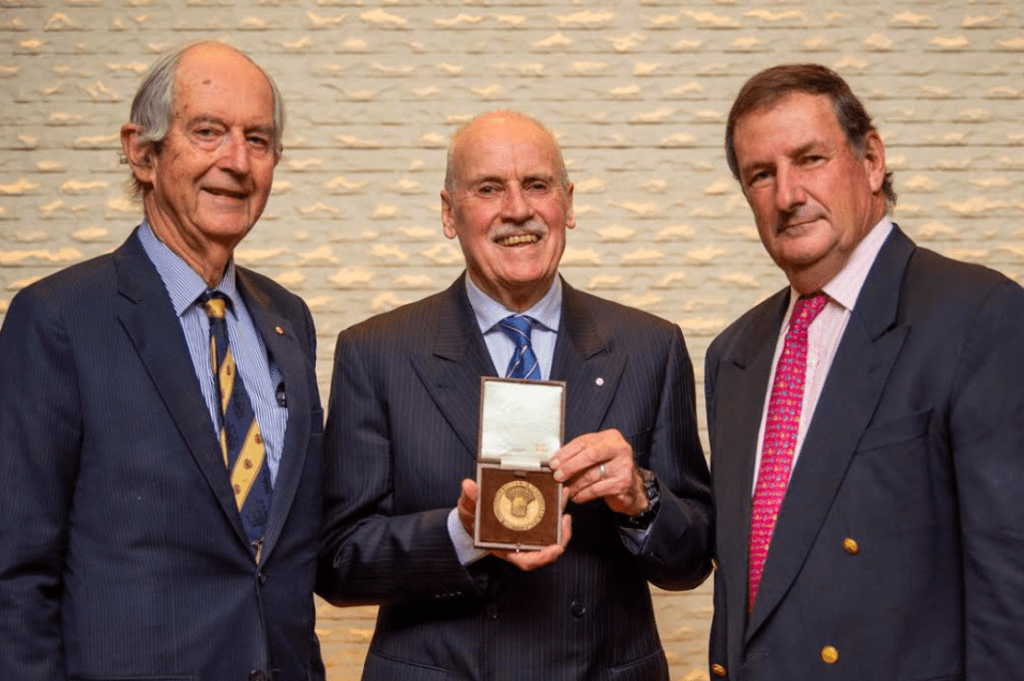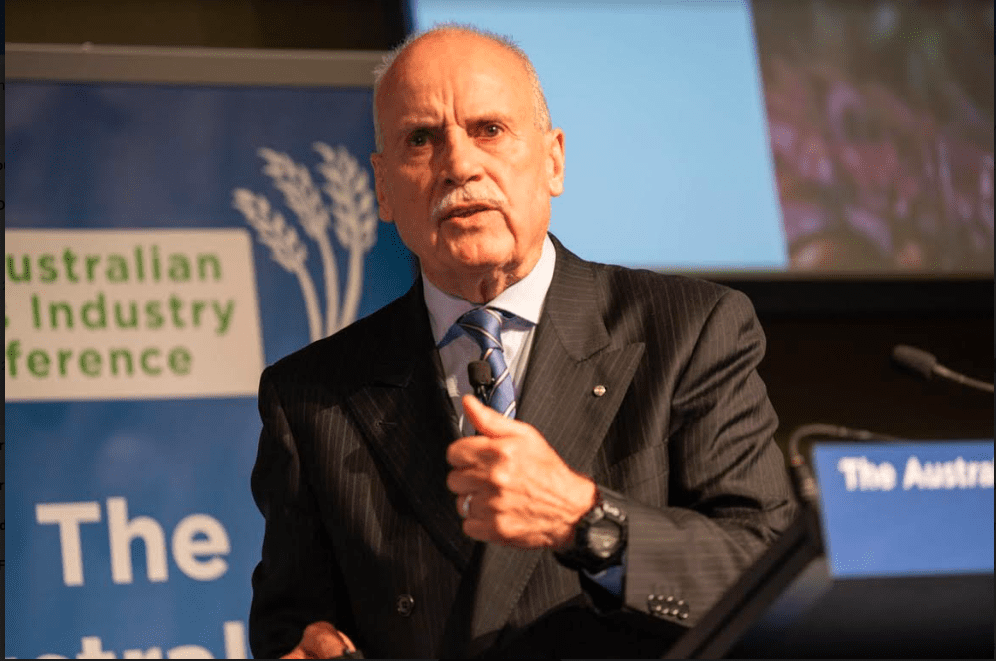
Receiving the 2019 Farrer Medal, Tim Reeves, Dookie, Vic (centre) with Farrer Trustees attending Australian Grains Industry Conference John Radcliffe AM, Adelaide, SA (left) and Geoff Mason, Boorowa, NSW (right). Photo: AGIC
ONE OF THE grains industry’s greatest honours, the Farrer Medal, has been awarded to researcher and pioneer in sustainable agriculture in Australia, Tim Reeves.
Professor Reeves was presented with the medal by Farrer Trustee and former CSIRO deputy chief executive Dr John Radcliffe AM yesterday in the company of Farrer Trustee Geoff Mason at the annual Australian Grains Industry Conference (AGIC) in Melbourne.
Its delegates, who gathered under the theme of Navigating the future: Roadmap to 2025, were appropriately chosen by Professor Reeves as the audience to hear his Farrer Memorial Oration.
Professor Reeves is professor in residence at the Faculty of Veterinary and Agricultural Sciences, University of Melbourne’s Dookie Campus, and has a wealth of involvement in research, development and extension behind him.
In his address, he has questioned the long-term sustainability of the canola-wheat rotation, and the inefficient use of applied nitrogen in cropping systems.
Moving target
Professor Reeves said no single system remained sustainable and that was what made sustainability a moving target.
He said farming methods were constantly in transition; ley farming transitioned to more intensive cropping, then to continuous cropping, all the time affecting the ability to keep doing the same thing by soil health and financial outcomes.
Professor Reeves said the falling preference for the use of biologically fixed nitrogen (BNF) compared with applied nitrogen, which had a large energy cost and was a significant component of farm inputs, needed to change.
“These changes are necessary not just on-farm but across the whole value chain.
“I have spent all of my working life improving the livelihoods of Australian farmers and of resource-poor farmers in developing countries.
“I believe that the greatest challenge humankind faces in the coming decades is food and nutritional security.
“Global population is growing at over 150 people per minute. They don’t all have to have a car or a TV but they do have to eat.”
Challenges abound
Professor Reeves said there were challenges to food and nutritional security which required urgent and greater attention from all key stakeholders, with each being both a global and a national issue.
When combined, they contributed to a “perfect storm” for agriculture.
He said population growth and people’s changing food preferences meant agri-food systems must provide more, and more nutritious, food but from less land, with less water and less energy-rich inputs.
At the same time, they must produce less greenhouse gas emissions and all of this under the spectre of the “multiplier effects” of climate change.
Professor Reeves said some of agriculture’s challenges were:
- Degradation and loss of natural resources affecting land, water and air quality;
- Adaptation to a changing climate of greater variability and more extreme events;
- Nitrogen-use efficiency averaging an unsustainably poor 50 per cent;
- Food losses and waste of around 30pc;
- Neglect of rural communities, with farmers being the front line of the food-security “battle”, and needing a better operating environment and technologies.
Professor Reeves said the “business as usual” idea would not be acceptable, and the world was now looking to the sustainable intensification of its agri-food systems to be able to produce more with lower inputs.
He said current systems would not meet the needs for sustainable food and nutritional security, nor the on-farm requirement of enduring profitability.
“Our natural resource base (one could substitute the term, capital base) is steadily being depleted.
“Many cropping systems now lack diversity and the dominant canola-wheat rotation is highly likely to be unsustainable.
“Livestock are now absent on many farms; legume use has diminished, and whilst resultant N fertiliser use has increased, accumulated N deficits are steadily increasing in many soils across Australia.
“Soil carbon is also being depleted on many cropping farms and this combination of diminishing soil C and soil N levels is alarming and a call for urgent attention.
“For other components of sustainable intensification, genetic gains have slowed in some crops and forages; water-use efficiency still averages around 40pc on many cropping farms; and herbicide-resistant weeds are indicative of systems that are too dependent on herbicide use and where more integrated approaches are required.”
Action required
Professor Reeves said five components of sustainable intensification needed to be effectively combined for maximum impact:
- Conservation agriculture (CA) – minimum soil disturbance, mulches, integration of crops, forages, livestock, trees and shrubs;
- Healthy soils – integrated soil nutrition management, building soil C and N;
- Improved crops, varieties, and species and breeds of livestock which featured high productivity, input-use efficiency, resistance and/or tolerance to abiotic and biotic stresses, and produced increased nutrition;
- Efficient water management – reduced water use and system and landscape efficiency to create “more crop per drop”;
- Integrated pest management – diverse systems, genetic resistance, and judicious use of safer pesticides at the system, farm and landscape levels.
Way forward
“In this Farrer Medal Oration, I have addressed each of these issues and identified potential solutions for their improvement and better contribution to sustainable intensification of our agricultural systems, not just on-farm but across the whole value chain.
“These changes are necessary if our farms are to remain productive, profitable and sustainable.
“The clear message from my long experience is that agricultural sustainability is a moving target, and that no single system has remained sustainable, for one reason or another and nor will it, now or in the future.
“It is equally clear to me that a new revolution of diversified farming based on the effective integration of crops, pastures, livestock, shrubs and trees together with diverse practices, is urgently required to make farms more resilient financially, and to the increasing challenges of climate change and climate extremes.
“To achieve this resilience, it is also an imperative to build soil carbon and nitrogen content and soil health generally.
“Looking back over my career, it is clear that the great advances achieved in our agricultural systems have resulted from effective collaboration between scientists and farmers, and I am confident and optimistic that this critical partnership will overcome the challenges and seize the opportunities of the future.”
“On the topic of partnerships, I wish to acknowledge all of the wonderful people that I have worked with over these 52 exciting years and not least my beautiful family without whom aiming high and making an impact would have been impossible.”
This article contains edited extracts of the Farrer Memorial oration given by 2019 winner Tim Reeves on Thursday 1 August 2019. Professor Reeves is professor in residence, University of Melbourne, Faculty of Veterinary and Agricultural Sciences, Dookie Campus.
Read his 2019 Farrer Memorial oration titled “Sustainable intensification of agriculture – for food and nutritional security” posted on the DPI NSW website here
Read more about his work and previous award recognition here.
Grain Central: Get our free cropping news straight to your inbox. Simply fill in and submit the ‘sign up’ box at the bottom right-hand corner of this page.


A very well written report. Is anyone reading it? There is too much dog eatdg in this world and absolute greed and self interest, in the short term.
I agree absolutely with the author’s thoughts and a pleased someone else besides me think this way.
As the National Advocate for Soil Health I totally support Prof Reeves’s identification of the challenges facing agriculture and the solutions he outlines in his Farrer address.